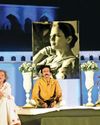Partition Voices by Kavita Puri recounts the experiences of those who were once subjects of the Raj, and are now British citizens

Recollections of the partition have always been intensely personal, with Indian and Pakistani victims reliving their traumatic memories. Partition Voices by Kavita Puri is not entirely different. What sets the book apart is that it focuses on the victims of the partition who are now British citizens. Denys Wild from Croydon, Surrey, was an officer in the Punjab Frontier Force. His love for his adopted homeland was so enduring that he chose to return to India in 1949 and spent the next 25 years at a tea plantation in Assam. “Mountbatten was a pretty ruthless man,” said Wild, and he “made sure it did go through quickly. If everybody had taken another six months or so, a lot more could have been sorted out.”
In the summer of 1944, nineteen-year-old Denys Wild boarded a scruffy steam train heading north towards Dehradun, in the foothills of the Himalayas – home to India’s Military Academy (IMA), where officers were trained for the British Indian Army. At around four in the morning, word came round that everyone had to get off. The engine was struggling, and the passengers, including Denys, were made to push the train up to the top of the hill. Then they all jumped back on and went on their way. This is Denys’s first memory of India.
Denys arrived at Dehradun, in the northern Indian state of Uttarakhand, in June. Since the early 1930s, the IMA had trained a handful of Indians to be officers. Denys was among the first group of British officer cadets to be trained with them. At the entrance to the building is an engraved plaque, reminding cadets of their duty:
The safety, welfare, and honor of your country come first – always and every time.
The safety and welfare of the men you command come next – always and every time. Your own welfare and safety come last – always and every time.
Denne historien er fra August 25, 2019-utgaven av THE WEEK.
Start din 7-dagers gratis prøveperiode på Magzter GOLD for å få tilgang til tusenvis av utvalgte premiumhistorier og 9000+ magasiner og aviser.
Allerede abonnent ? Logg på
Denne historien er fra August 25, 2019-utgaven av THE WEEK.
Start din 7-dagers gratis prøveperiode på Magzter GOLD for å få tilgang til tusenvis av utvalgte premiumhistorier og 9000+ magasiner og aviser.
Allerede abonnent? Logg på

The female act
The 19th edition of the Qadir Ali Baig Theatre Festival was of the women and by the women

A SHOT OF ARCHER
An excerpt from the prologue of An Eye for an Eye

MASTER OF MAKE-BELIEVE
50 years. after his first book, Jeffrey*Archer refuses to put down his'felt-tip Pilot pen

Smart and sassy Passi
Pop culture works according to its own unpredictable, crazy logic. An unlikely, overnight celebrity has become the talk of India. Everyone, especially on social media, is discussing, dissing, hissing and mimicking just one person—Shalini Passi.

Energy transition and AI are reshaping shipping
PORTS AND ALLIED infrastructure development are at the heart of India's ambitions to become a maritime heavyweight.

MADE FOR EACH OTHER
Trump’s preferred transactional approach to foreign policy meshes well with Modi’s bent towards strategic autonomy

DOOM AND GLOOM
Democrats’ message came across as vague, preachy and hopelessly removed from reality. And voters believed Trump’s depiction of illegal immigrants as a source of their economic woes

WOES TO WOWS
The fundamental reason behind Trump’s success was his ability to convert average Americans’ feelings of grievance into votes for him

POWER HOUSE
Trump International Hotel was the only place outside the White House where Trump ever dined during his four years as president

DON 2.0
Trump returns to presidency stronger than before, but just as unpredictable